Anti-Semitism is a form of racism.
Like all racism, anti-Semitism has at times been taken to egregious lengths. Such racism has all too often resulted in genocide and other horrifying instances of man's inhumanity to man.
"Anti-Semitism is a problem for all of us who care about justice in the world. …. Our ministers should be preaching against anti-Semitism from the pulpit. The same people who are anti-Semitic are often racist, too. These are not separate issues."
—Darren Walker, President, Ford Foundation
Hi, your friendly Bible Curmudgeon here.
I'm back to pick on bible translators once again, this time over an issue that has literally been a matter of life and death. Careful, thoughtful, honest translation is important. This edition of "The Curmudgeon's Bible" is a strong example of why.
Particularly in the wake of the Holocaust,
the author of the Book of John has been accused of anti-semitism.
In today's essay, I propose to shift that blame. I believe that it is not John who is guilty of promoting anti-Semitism, but, if anyone, the translators of the gospel, or "good news" narrative that John authored.

Is the Book of John Anti-Semitic?
Image by Frater5 [Public domain], via Wikimedia Commons
What is the source of this accusation?
Critics have long complained that John has stirred up negative feelings against the Jews. How? By speaking unfavorably of "the Jews," and by portraying "the Jews" as perpetrators of the false accusations against Jesus that led to his apprehension and execution.
My findings are quite different.
Significant internal evidence in John's book leads me to conclude that when John, as an author, referred to "the Jews," he was impartially denoting a geographic and political entity, and not making a racist statement.
My thesis has to do with the mis-translation of a single word.
Once again, I have become convinced that bible translators have missed the boat on this one. In simple terms, they should have translated Ἰουδαῖοι as "Judeans."
I don't know whether the translators have a "hidden agenda." Nevertheless, their inconsistency in rendering the language of the book of John, at least in the case of English translations, may have led to racist attitudes among those predisposed to rushing to judgment.

The Belgian version of the Yellow Badge, compulsory from 1942
By DRG-fan (Own work) CC BY-SA 4.0, via Wikimedia Commons
I find the clearest example in John chapter four.
In that account of Jesus asking a Samaritan woman for a drink of water, three geographically identified groups of people are mentioned.
Jesus and his followers had been walking all day. Three specific geographical areas are highlighted.
"...he left Judea and departed again for Galilee. And he had to pass through Samaria."- John 4:3-4
The lexicon makes it clear that in this context, "Judea," "Galilee," and "Samaria" all refer to geographic regions. These are territories, each with their own politics, customs, and religious traditions.
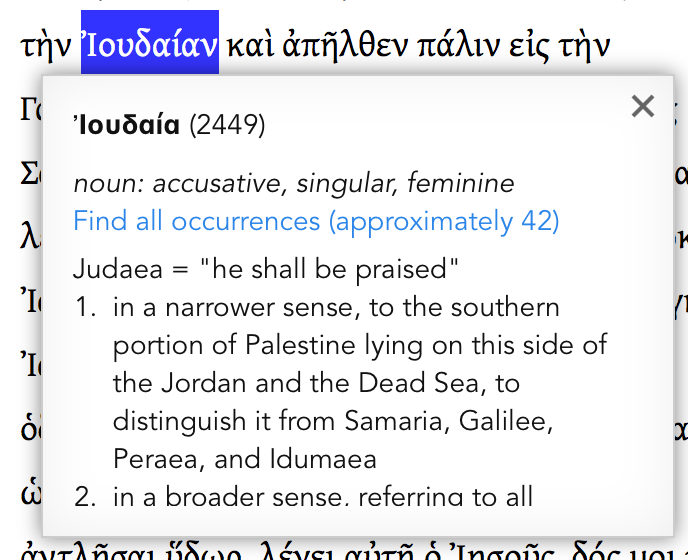
|
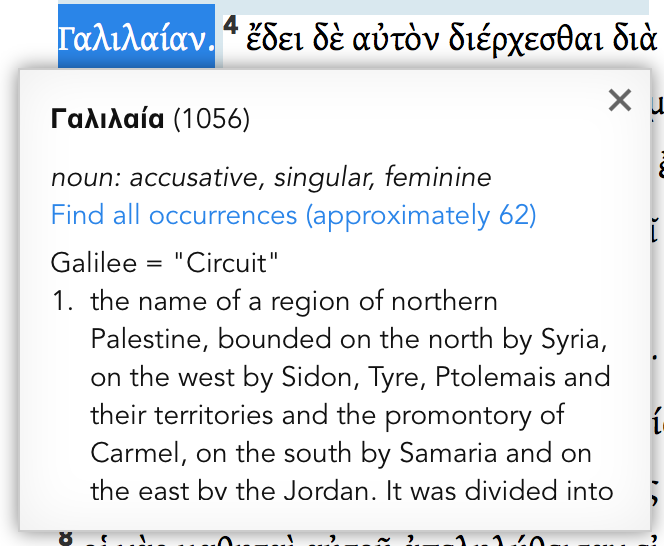
|
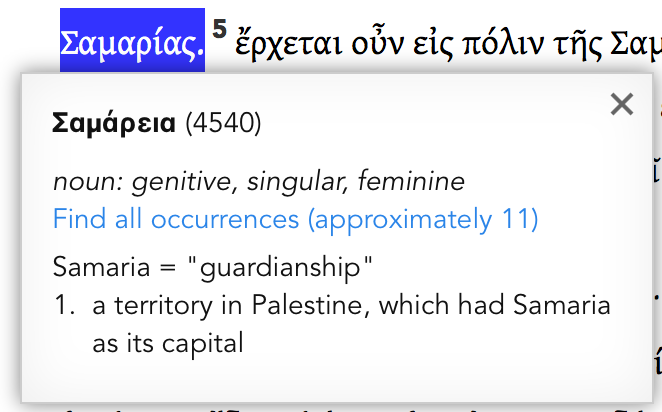
|
Lexical information for Judea, Galilee, and Samaria from the marvelous BibleWebApp
So far, so good. The translators have rendered Judea, Galilee, and Samaria into English consistently as territorial designators. However, we soon find a word that is unaccountably rendered in a different way.
Consider these three words.
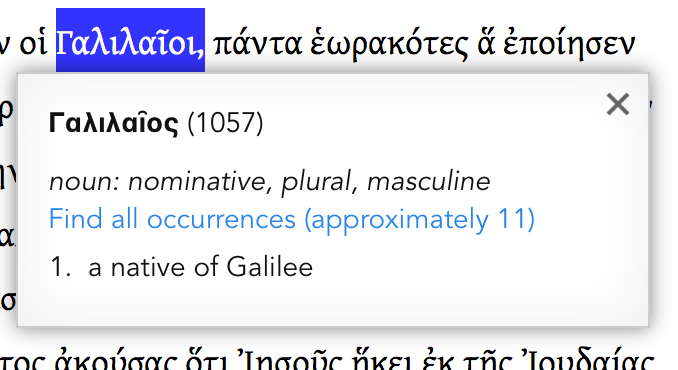
|
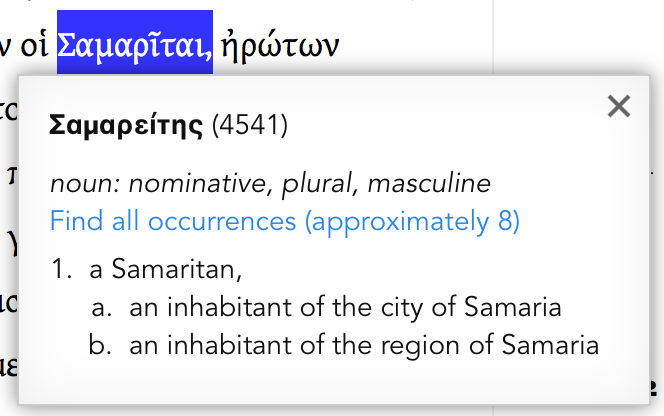
|
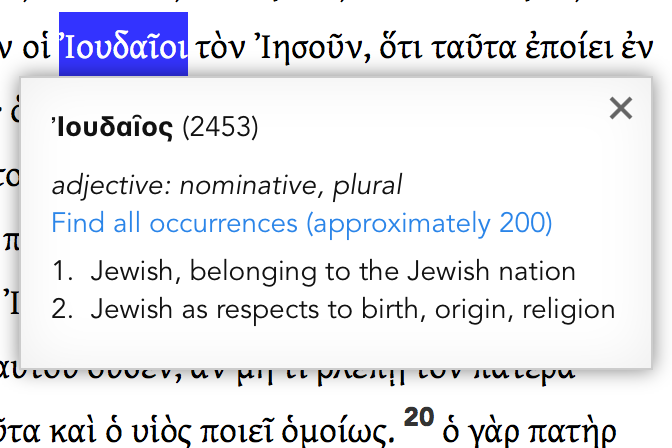
|
Lexical information for Galileans, Samaritans, and... Jews? - also from BibleWebApp
Why is the third word treated differently?
Why is it rendered "Jews?"
Why aren't these clearly parallel words instead translated consistently as Galileans, Samaritans, and Judeans?
I can only believe that in John's mind, as a writer, that was precisely his original intent. John was not being racist at all. He was simply speaking of the contemporary populations of the geographical and political territories in his story. Unfortunately, to the modern English-speaking mind, the word "Jews" brings an ethnic group, a particular race, to mind.
Translating the word as "Judeans" would be quite analogous to, in the present day, making reference to "San Diegans," meaning the people and policies of San Diego County, or speaking of "Los Angelenos" to describe the people and politics of Los Angeles.
Even the lexicons are no help, defining the first two as "a native of Galilee" and "an inhabitant of the region of Samaria," but then switching to "Jewish, belonging to the Jewish nation."
Jesus himself once said:
"A prophet is not without honor except in his hometown and in his own household."- Matthew 13:57
He suffered the indignity of familiarity that every prophet suffers. The local crowd, his townspeople, simply couldn't see and accept him for who he truly was.
"He came to His own, and those who were His own did not receive Him."- John 1:11
Terminology confusion like this continues in the present day.
Consider the contrast in terminology between using "Jews and Arabs" versus using "Israelis and Palestinians" in a discussion. The former is racial and ethnic, the latter is territorial. Not all Israelis are Jews. Not all Arabs are Palestinians. Can you see the distinction?
Confusion in terminology causes dissension on other continents as well. For example, if you browse this Wikipedia article you will see there is ongoing controversy over the word "Americans."

New York: New Jerusalem? By Grant E. Hamilton [Public domain], via Wikimedia Commons
What can we conclude from this discussion?
I suppose that offenses are inevitable. Humanity in the present age at times seems doomed to misunderstandings, hatred, and dissension. Unfortunately, even bible translations have added to this sad state of affairs.
However, accusing John (himself a Jew) of anti-Semitism is ridiculous. If anything has led to such an utterly wrong conclusion, it is that bible translators have failed to be consistent in their rendering of John's original language into modern English.
Sadly, I am aware of no English bible translations that get this one right...
I think it inexcusable that such egregious errors continue to be promulgated in modern translations.
More from the Curmudgeon:
Jesus and Nicodemus
Second Thessalonians Chapter 1
The Word "Church"
The Word "Angel"
🕎Is John's Gospel Anti-Semitic?🕎
FIN
You are why I'm here on Steemit!
I have very eclectic interests and hope, over time, to write about them all.
⬇️To Check Out @creatr's World⬇️CLICK Each Image Below⬇️

|

|

|
